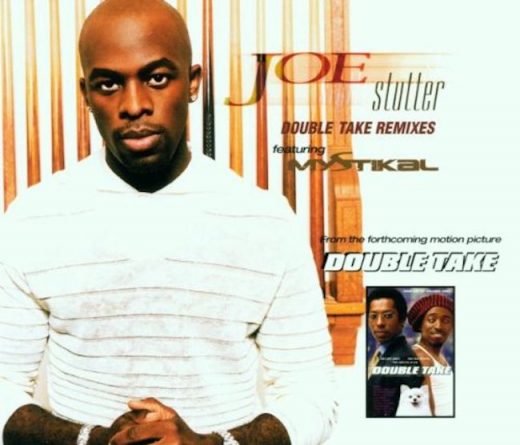According to one of our preferred sources:
For as long as popular music has existed, songwriters have been using vocal stutters as a musical trick. The earliest example that I can find is “Oh Helen!,” a single that Arthur Fields released in 1915. On that song, Fields sings about a poor guy who can’t get his speech impediment under control when he tries to speak to one particular girl. Fields and his backup singers imitate the effect. It’s supposed to be funny. In 1915, maybe it was.
Through the decades, the lyrical stutter has served all kinds of different functions. On the Who’s “My Generation,” Roger Daltrey’s stutter is supposed to imply the frenzy of youth and maybe whatever uppers the narrator is on that week. (“My Generation” peaked at #74.) On the Beach Boys’ “Barbara Ann,” the stutter is one more way for Brian Wilson to layer nonsense harmonies. (“Barbara Ann” peaked at #2. It’s a 9.) For the Trashmen’s “Surfin’ Bird,” the stutter helps the song along on its quest to the achieve sonic anarchy. (“Surfin’ Bird” peaked at #4. It’s a 10.)
The stutter can be showoffy, as on George Thorogood’s “Bad To The Bone.” It can be horny, as on the Knack’s “My Sharona.” It can be rhythmic, as on the Bee Gees’ “Jive Talkin’.” Sometimes, you get something like David Bowie’s “Changes,” where the stutter serves no clear purpose except to make the song that much more memorable. (“Changes” peaked at #41.)
If anything, there’s more stuttering on songs now than there ever has been before. Digital editing lets producers chop vocal tracks into shards, using voices to emphasize the beat. The stuttering itself usually isn’t analog, but it still works as a way to refract a voice like light through a prism. That presumably doesn’t have much to do with the way actual stammers work. Instead, it’s a playfully disorienting musical technique. Consider the case of Joe’s “Stutter,” a #1 hit about stuttering that uses both analog and digital stutters to worm its way deeper into your brain.
“Stutter” is a fascinating song from a not-particularly-interesting singer. Joseph Lewis Thomas has already been in this column once. In 1999, Joe was a journeyman R&B artist who’d scored a few minor hits. Then, Mariah Carey brought Joe in to sing on her ballad “Thank God I Found You” when producers Jimmy Jam and Terry Lewis couldn’t get label clearance for K-Ci & JoJo to appear on the track. Joe did his job on the song. Soon after, he came out with the 2000 album My Name Is Joe, which has what might be the single most boring title in existence but which became Joe’s biggest record by far.
The first single from My Name Is Joe was “I Wanna Know,” a smooth but fairly generic R&B love song, and it peaked at #4. (It’s a 4.) Joe followed that single with “Treat Her Like A Lady,” which had a jittery beat and a chopped-up Isaac Hayes sample. That song was more interesting than “I Wanna Know,” but it was a relative flop, peaking at #63. Still, Joe was already enjoying more success than he’d ever had. By the end of 2000, My Name Is Joe was double platinum.
“Stutter” was the third single from My Name Is Joe, but the version that topped the Hot 100 wasn’t the same track that originally appeared on Joe’s album. That track came from songwriters Ernest Dixon and Roy “Royalty” Hamilton. Roy Hamilton was named after his grandfather. The first Roy Hamilton had been an R&B star in the ’50s, and he’d gotten to #6 on the pre-Hot 100 Billboard singles chart with his 1955 version of “Unchained Melody.” In the Hot 100, Roy Hamilton peaked at #12 with 1961’s “You Can Have Her.”
As for Roy “Royalty” Hamilton, he’d gotten his start working with new jack swing innovator Teddy Riley. The idea for “Stutter” came from Ernest Dixon, who’d met Hamilton when the two of them were working for R. Kelly’s production company. During a drive between New York and New Jersey, Dixon had the idea for a song that featured stuttering, and he came up with a verse and a hook before the drive was over. Hamilton put together a track for the song, and he and Dixon finished it and brought it to Teddy Riley. At the time, Riley was leading Blackstreet, a group that’s already appeared in this column. Riley wanted to record the song with Blackstreet, but the group didn’t have an album in the works at the time, so Hamilton kept shopping the song around.
Roy Hamilton played the “Stutter” demo for Jive Records founder Clive Calder. Calder liked the song, and he suggested it for Joe. Joe recorded the track with Roy Hamilton and Teddy Riley producing. The original version of “Stutter” is a relatively slick R&B number. Joe’s narrator suspects his girlfriend of cheating. When she tries to tell him where she was last night, she stutters, and Joe takes that to mean that she’s lying. But when Joe sings about it, he stutters himself. It’s not clear whether he’s imitating her or whether he’s nervously angry enough that he stutter becomes his. On the track, Hamilton and Riley edit Joe’s voice, making it skip and hesitate, but the track itself is lush and spacey, full of acoustic guitars and cascading windchimes.
For the original version of “Stutter,” Roy Hamilton and Teddy Riley sampled the ticcy drum track from “I’m Gonna Love You Just A Little More Baby,” a song that former Number Ones artist Barry White took to #3 in 1973. (It’s an 8.) That sample has appeared on hundreds of records, and it didn’t really set “Stutter” apart. In the late ’90s, producers who’d followed Teddy Riley’s lead had built stutters into songs, making R&B into something more warped and exciting. “Stutter” wouldn’t really catch fire until another producer took the song apart and put it back together again.
“Stutter” reached its final form when it showed up on the soundtrack of Double Take, a critically reviled Orlando Jones/Eddie Griffin buddy comedy. Double Take came out in the January 2001 dumping grounds, barely made back its budget, and earned a robust Tomatometer rating of 12%. I’ve never seen Double Take, but it’s about Orlando Jones’ stockbroker and Eddie Griffin’s petty crook having to switch identities for some reason. (Presumably, the narrative reason isn’t “let’s just try to do Trading Places again, but that’s got to be the reason for the film’s existence.) If you have forgotten about this movie’s existence, or if you’ve never heard of it, I forgive you.
Double Take might not have a towering legacy, but it did give us the brighter, weirder, better version of “Stutter.” The remix specialist Allen “Allstar” Gordon reworked “Stutter” specifically for the Double Take soundtrack, and he did a whole lot to juice the track and make it more exciting. Gordon’s big idea was to combine “Stutter” with “Passin’ Me By,” the giddy and inventive 1993 single from LA rap group the Pharcyde. “Passin’ Me By” is a perfect song, a funky adenoidal lament about not getting laid. It’s the biggest hit that the Pharcyde ever had, and it peaked at #52.
Producer J-Swift built the “Passin’ Me By” beat from a sample of Quincy Jones’ funky 1973 cover of the Lovin’ Spoonful’s “Summer In The City.” (Quincy Jones has been in this column a bunch of times as a producer. As an artist, his highest-charting single is the 1982 James Ingram collab “One Hundred Ways,” which peaked at #14.) Joe’s “Stutter” remix uses the same beat as “Passin’ Me By,” and it also builds a secondary hook out of one of Fatlip’s lines from that song: “My dear my dear my dear, you do not know me, but I know you very well.” That line doesn’t make a whole lot of sense in the context of “Stutter,” but it sounds amazing.
In Fred Bronson’s Billboard Book Of Number 1 Hits, Joe says that the “Stutter” remix was his idea: “Sitting in a limo one night, I heard a beat on the radio, and I started singing along to it. That’s where the idea came from, to merge what was an old school track from years ago for Quincy Jones, and then the Pharcyde used it. It was an incredible loop to use with that type of song.” With the “Passin’ Me By” beat swapped in, “Stutter” gets faster and more hectic, and its vocal manipulations become increasingly freaked-out — an effect that only becomes stronger when Mystikal shows up.
For some very good reasons that we’ll get to, Mystikal no longer has much of a reputation in rap music. In 2001, though, Mystikal was essentially a deep-South Busta Rhymes, a gravelly energy-bomb who injected every track with chaotic adrenaline. Michael Tyler grew up in New Orleans’ 12th Ward, and he served as a combat engineer in the army during the Gulf War. In 1994, recording under the name Mystikal, Tyler released his self-titled debut album on a local indie label called Big Boy Records. A year later, Jive picked up Mystikal, and he re-released that first album as Mind Of Mystikal.
Mystikal’s style was weird and unique. His country accent was thick, and he’d go back and forth between jittery fast-rap bursts and guttural roars. He sounded erratic and unhinged, and the effect was powerful. Mind Of Mystikal didn’t have any Hot 100 hits, but it went gold, and it probably made Mystikal the most famous rapper from New Orleans at the time. A year after the album’s release, New Orleans hustler Master P brought Mystikal into his expanding No Limit Records empire, and Mystikal became a key part of the the No Limit sound. On a posse cut like “Make ‘Em Say Uhh!,” the single that Master P took to #16 in 1998, Mystikal could show up at the end of the track, his voice detonating like a bomb. Mystikal was even more potent on “It Ain’t My Fault,” a #18 hit for Master P’s brother Silkk The Shocker in 1998. On that track, Mystikal’s insanity contrasts with the spartan, hypnotic beat in a way that sounds combustible, almost dangerous.
In 2000, Mystikal jumped ship from No Limit, which was starting to lose steam, and he went to work with the Neptunes, the rising production duo from Virginia Beach. (The Neptunes will eventually appear in this column as producers, and Pharrell Williams, the more visible half of the duo, will be here as an artist, as well.) The Neptunes knew exactly how to use Mystikal’s voice. They treated him like a Y2K James Brown, building slinky gutbucket digital funk tracks around his amped-up growl. Two Neptunes-produced singles from Mystikal’s 2000 album Let’s Get Ready became major hits, with “Shake Ya Ass” peaking at #13 and the Nivea collab “Danger (Been So Long)” getting to #14. I loved those songs.
Mystikal made perfect sense on the “Stutter” remix. Even before Mystikal arrives, the track is anxious and off-kilter. The avant-garde electronic producer Cex once told me that he thought the producers of “Stutter” must’ve been listening to some way-out dance tracks. I don’t know whether that’s true, but they definitely made the “Passin’ Me By” beat into something urgently cluttered. That old Quincy Jones organ and bassline seem to fight with the synth-strings and the choppy squelch noises. Amidst all that, Joe, usually so smooth and anonymous, sounds like he’s losing his mind. In his voice, I hear some of the paranoid fury of prime Michael Jackson. Mystikal adds to that frenetic mood, adding those stutters to his own verse and ranting about what a dangerous person he is: “I’m keepin’ it gangsta with all the tattoos and the platinum mouth! I was the rapper you heard about strappin’ up in the Waffle House!”
In its final form, “Stutter” is nothing like the standard R&B track with the rap feature. Instead, it’s a sonic mirror of the feelings that it expresses. Joe’s narrator can’t let go of the idea that his girlfriend is cheating. There’s no heartbreak in the song; there’s just anger. Joe takes all the telltale signs, the messed-up hair and makeup everywhere, as provocations or insults. Mystikal backs him up and eggs him on. The “Stutter” remix is a rare thing. It operates as a catchy hit song, a cutting-edge production showcase, and a feverish mood-piece. One track shouldn’t be able to work on all those levels, but “Stutter” does.
The “Stutter” video mirrors the song’s looniness nicely. Naturally, most of the clip is Joe freaking out about the idea that his girlfriend, played by the future She Spies star Natashia Williams, is running around on him. He appears to hire Mystikal as a private detective, though most private detectives, from what I can tell, don’t run around in giant leather hoodies with their names written across the front. Mystikal follows Williams to a desert hotel and makes a video of her hooking up with some guy. He also pulls his muscle car alongside hers so that he can scream at her while driving. This all seems like an unhealthy way to deal with a partner’s infidelity. But in the final plot twist, I guess it was really Natashia Williams’ evil twin who was hooking up with that guy? Joe and Mystikal should’ve really taken the existence of a twin sister into account. The storytelling is incoherent, but the video itself is fun spectacle.
Joe didn’t have another “Stutter” in him. My Name Is Joe eventually went platinum a third time, and then Joe never approached those numbers again. Since “Stutter,” Joe hasn’t had another single in the top 10. “What If A Woman,” the biggest hit from Joe’s 2001 follow-up Better Days, peaked at #63. 2003’s …And Then had one song, “More & More,” that made it to #48, and both of those albums went gold. But Joe’s biggest hit since “Stutter” isn’t one of his own songs. It’s “Wanna Get To Know You,” the 2003 G-Unit track that had Joe on the hook, and it peaked at #15. (As a group, G-Unit’s highest-charting single is 2003’s “Stunt 101,” which peaked at #13. G-Unit leader 50 Cent will eventually appear in this column.)
Eventually, Joe parted ways with Jive and started putting out music independently. Joe has mostly remained active, though he hasn’t released an album since 2016’s My Name Is Joe Thomas. (I can’t believe he felt like he needed to use that album title again.) My favorite Joe-related thing is his participation in the late DJ Kay Slay’s “Not Your Average Joe,” a 2004 track that also features Fat Joe and Joe Budden. I love the idea that these guys should all be on a song together just because they’re all named Joe.
I wish I had anything fun to say about Mystikal. After “Stutter” hit #1, Mystikal released the 2001 album Tarantula, and the Neptunes-produced single “Bouncin’ Back (Bumpin’ Me Against The Wall)” aimed to find common ground between Southern rap and New Orleans second-line jazz. It peaked at #37. Mystikal also added his rabid snarl to reckless club anthems like Lil Jon’s “I Don’t Give A Fuck” and Ludacris’ immortal “Move Bitch.” (“Move Bitch” peaked at #10. It’s an 8. Ludacris will eventually appear in this column.) Then, Mystikal went to prison.
In 2003, Mystikal pleaded guilty to sexual battery and extortion. Mystikal and his two bodyguards had sexually assaulted his hairstylist, and they’d recorded the crime on video. It’s hard to fathom the arrogance and entitlement that would lead anyone to do that shit. Mystikal was sentenced to six years in prison, and he got out in 2010. For a minute, it seemed like Mystikal’s career might pick up again. Birdman signed Mystikal to Cash Money, and Mystikal teamed up with Mark Ronson, an artist who will eventually appear in this column, on the 2015 single “Feel Right.” But then Mystikal just kept getting arrested.
In 2012, Mystikal spent a few more months in jail for domestic abuse. In 2017, Mystikal was arrested again for rape, and he was held in jail for more than a year before the charges were dropped. Earlier this summer, police in Baton Rouge arrested Mystikal for a number of charges, including first-degree rape and domestic abuse battery by strangulation. Last week, Mystikal was indicted on those charges. If he’s convicted, he’ll face a mandatory life sentence.
At this point, it’s virtually impossible to see Mystikal as anything other than a habitual rapist and predator. The man was hugely important to the explosion of Southern rap, and he was an inimitable livewire voice, but he was also a monster. I don’t feel the same way about Mystikal as I do about someone like R. Kelly. Mystikal’s story has gone the way a story like this is supposed to go. Music-business power players haven’t put insane resources into keeping Mystikal free. He’s committed terrible crimes, and he’s done serious time for those crimes. He’ll probably do more time. He might not ever get out.
Cases like this are always personal. Plenty of near-universally beloved musical heroes are also evil, abusive people. We all make our little calculations about whether we can still listen to the music that those people made. I feel a little twinge of disgust whenever I hear Mystikal’s voice now, but it hasn’t fully stopped me from enjoying “It Ain’t My Fault” or “Shake Ya Ass” or “Stutter.” Maybe that’s wrong, and the score below would probably be a point higher if Mystikal’s presence wasn’t so repellant now, but that’s where I’m at. Mystikal: Bad person. “Stutter”: Good song. But I’m not especially confident about that stance. Instead, I’m so nervous that I might start stuttering.
GRADE: 8/10 – The Number Ones: Joe’s “Stutter” (Feat. Mystikal) (stereogum.com)


















